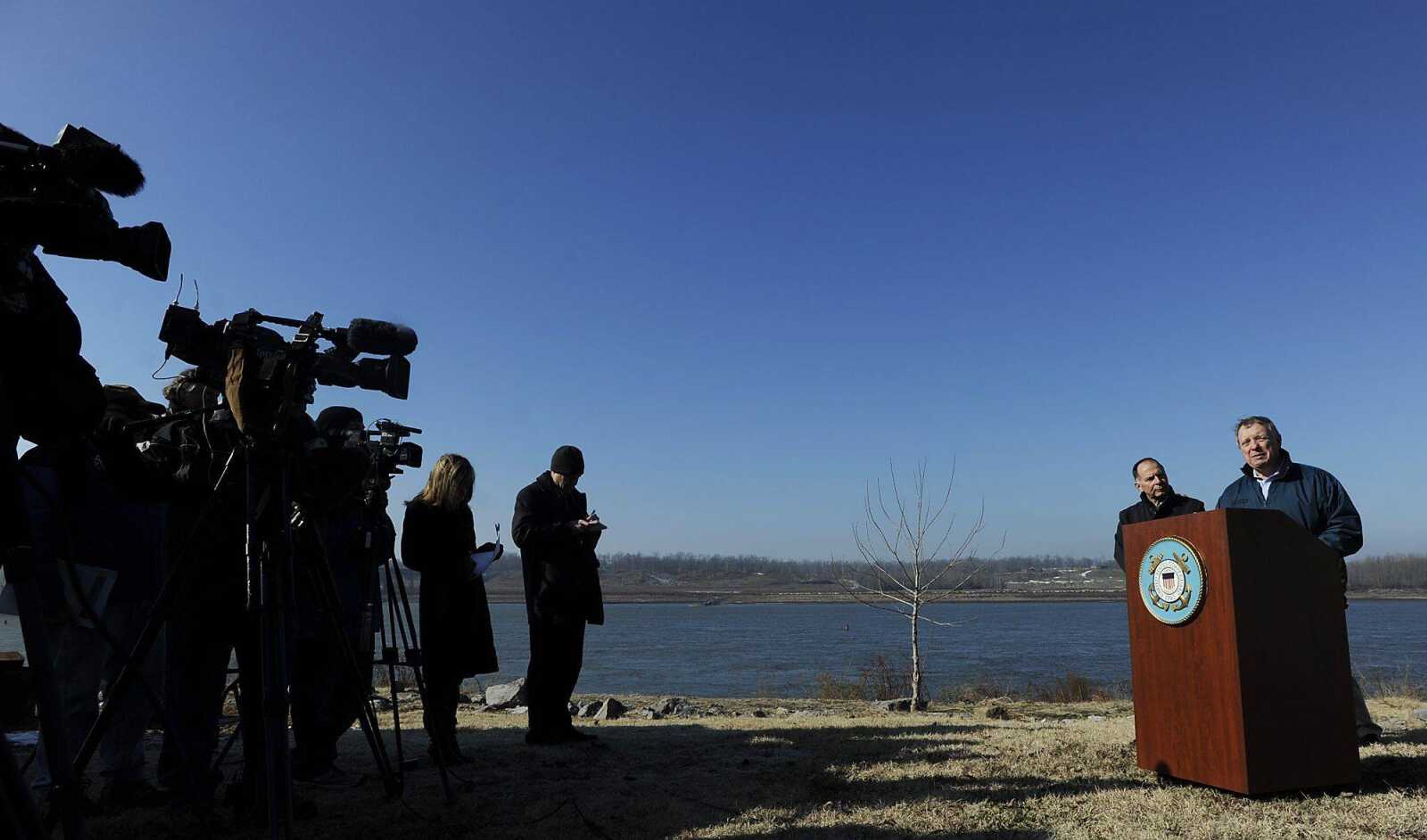Illinois senator, congressman tour Mississippi River work
THEBES, Ill. -- Two federal lawmakers complimented efforts to deepen the bed of the drought-stricken Mississippi River, and promised to continue to bring the situation to the attention of the White House. Sen. Dick Durbin, D-Ill., and Rep. Bill Enyart, D-Belleville -- along with representatives of the U.S. ...
EDITOR'S NOTE: A paragraph has been changed to correct loads barges can carry.
THEBES, Ill. -- Two federal lawmakers complimented efforts to deepen the bed of the drought-stricken Mississippi River, and promised to continue to bring the situation to the attention of the White House.
Sen. Dick Durbin, D-Ill., and Rep. Bill Enyart, D-Belleville -- along with representatives of the U.S. Army Corps of Engineers, U.S. Coast Guard, River Industry Executive Task Force and Illinois Farm Bureau -- on Monday toured the area where the corps is removing bedrock pinnacles. After the tour, Durbin and Enyart addressed reporters at a riverside pavilion at Thebes.
Durbin said President Barack Obama is "well aware" of the navigation barriers that have caused a reduction in the number and weight of supply barges that can safely travel on the river. He said he has been keeping in touch with the White House since the issue was raised in a meeting two weeks ago, and will continue to do so until the problem is resolved.
"This is not just a local problem," Durbin said. "We are going to keep on this all the way through."
According to Durbin, the White House has said "everything is on the table" to help keep the channel clear. When pressed about whether releasing water from the Missouri River is an option, Durbin said potential time-consuming legal battles have led to the pursuit of other strategies.
The river has been closed north of Thebes for 16 hours every weekday since Dec. 15 to allow contractors to remove the rock formations and deepen the travel channel. The goal of the project, which also has included dredging and releasing water from Carlyle Lake upstream, has been to maintain a channel of at least nine feet so vessels that sit eight feet deep in the water can travel safely.
"It really is amazing to consider the technology that is at work here," said Durbin, who estimated removal operations, paid for by the corps' regular operating budget, have cost $9 million.
Unlike some sections of the river, the river bottom in the problem area is rock instead of sand, so it is important that vessels not test the bottom by accidental contact, said Scott Noble of the River Industry Executive Task Force.
Rear Admiral Roy A. Nash, commander of the Eighth Coast Guard District, said the deepest route is marked by buoys, which will be adjusted to guide vessels along the safest passage.
Despite the reduced hours, Durbin said there has not been a backlog of traffic waiting more than a day.
However, fewer barges loaded with less weight than usual have been transporting goods along the shallow, narrow channel, Noble said.
In good conditions, Noble said, 25 to 30 barges per tow with drafts, the portion of the vessels that are submerged, of 11 to 12 feet are loaded with 1,900 to 2,000 tons per barge. Right now, 15 barge tows are loaded to 9-foot drafts at 1,500 tons per barge. If the draft depth had to be reduced to 8 feet, tonnage drops to about 1,300 to 1,350 tons per barge and the smaller tow vessels that can operate in the shallower water, which are scarce, could only handle eight to nine barges in a tow.
Richard Guebert, vice president of the Illinois Farm Bureau, expressed thanks for efforts to assist local agriculture, which relies on keeping the channel operational. He said local farmers are the sole source of corn and soybeans at this time of year and transporting those commodities in a timely manner is critical.
Enyart said river levels are historically at their lowest point in January and upcoming weather changes and snow melt may help.
"Things are looking much brighter than they were a week or two ago," Enyart said.
salderman@semissourian.com
388-3646
Pertinent address:
Thebes, Ill.
Connect with the Southeast Missourian Newsroom:
For corrections to this story or other insights for the editor, click here. To submit a letter to the editor, click here. To learn about the Southeast Missourian’s AI Policy, click here.











